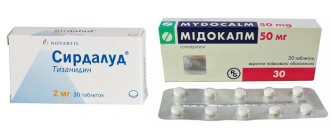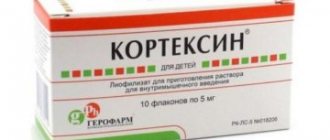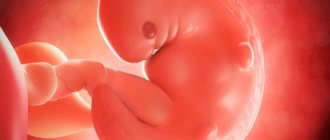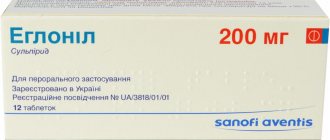Fevarin: instructions for use, price, reviews from psychiatrists and patients, analogues
The antidepressant Fevarin based on the substance fluvoxamine is one of the most powerful serotonin reuptake inhibitors.
The French drug is successfully used in psychiatry and allows patients to be treated even with severe mental disorders.
It requires careful use, as it can cause addiction and is dangerous due to severe adverse reactions.
Compound
The main active ingredient, fluvoxamine, is a specific inhibitor that affects brain neurons.
It has no effect on adrenergic processes, does not cause a sedative or stimulating effect.
It has a cumulative effect, for this reason the therapeutic effect of the drug is noticeable no earlier than after 10-15 days .
In some patients, positive changes in mental state are observed only after
a month .
Additional components: mannitol, starch (pregelatinized and corn), silicon dioxide, sodium stearyl fumarate, macrogol, talc, hypromellose, titanium dioxide.
Available in white film-coated tablets.
Indications for use
Prescribed in the treatment of depression and obsessive-compulsive disorders.
Can be used in the complex treatment of panic attacks, neuroses associated with schizophrenia.
Prescription restrictions
It is prohibited to prescribe an antidepressant for:
- individual immunity of the body to the components of the composition;
- taking monoamine oxidase inhibitors;
- pregnancy.
Prescribed with caution during breastfeeding.
Through clinical studies, it was possible to find out that the substance fluvoxamine can be transmitted to the baby through mother's breast milk, causing negative reactions in the child.
For this reason, it is not recommended to prescribe an antidepressant during lactation. In case of emergency, when the mental state of a young mother is at risk and therapy with Fevarin is required, breastfeeding must be abstained for the period of treatment.
It is not advisable to take an antidepressant if:
- epileptic seizures;
- convulsive states;
- elderly and children;
- kidney pathologies;
- liver diseases;
- thrombocytopenia.
If the prescription of safer analogues is not practical, therapy should be accompanied by constant medical supervision.
Possible negative reactions
When taking an antidepressant, adverse reactions may occur:
- decreased appetite;
- lack of body weight, up to the onset of anorexia;
- hallucinations;
- persecution mania;
- euphoria;
- confusion;
- suicidal tendencies;
- anxiety;
- nervousness;
- increased excitability;
- insomnia at night;
- daytime sleepiness;
- seizures;
- dizziness;
- headache;
- tachycardia;
- nausea;
- vomiting;
- diarrhea;
- disturbances in liver function;
- hypotension (low blood pressure);
- increased sweating;
- urinary disorders;
- photosensitivity.
Women may experience menstrual irregularities during treatment with Fevarin.
Like most antidepressants, Fevarin causes “ withdrawal syndrome ,” especially when the drug is abruptly stopped.
The patient begins to feel body aches, nervousness, severe depression, insomnia, convulsions, rapid heartbeat, and headache.
These symptoms go away quite quickly when taking the next dose of an antidepressant. This worsens the patient’s dependence on the drug.
To alleviate the patient’s condition and avoid “withdrawal syndrome,” it is necessary to gradually reduce the dose of the drug, until it is completely discontinued.
Overdose
Exceeding the permissible dose of antidepressants is very dangerous, as it can put the patient into a coma or lead to death.
According to statistics, such situations arise mainly when intentionally taking large doses of Fevarin (for example, with suicidal tendencies).
Also, an overdose of Fevarin may be accompanied by:
- nausea;
- vomiting;
- diarrhea;
- drowsiness during the day;
- dizziness;
- loss of consciousness;
- a sharp decrease in blood pressure;
- cardiac dysfunction;
- convulsions;
- liver pathologies.
In case of an overdose of an antidepressant, it is necessary to perform gastric lavage and, if necessary, symptomatic therapy is prescribed.
The patient needs to drink activated carbon (at a dosage of 1 tablet for every 10 kilograms of weight). In some cases, the patient is prescribed diuretic drugs.
Instructions for use
For depressive syndrome, the patient is prescribed 50 or 100 mg of the drug for a single dose in the evening.
If necessary, the dose can be gradually increased to 300 mg (150 mg in the morning and evening). Therapy should last at least six months.
For obsessive-compulsive disorder, in the first 3-4 days the patient is prescribed a minimum dose of 50 mg per day. The dosage is gradually increased, but it is unacceptable to take more than 300 mg of Fevarin per day.
If after 3 months of taking the drug no positive results are noted, the patient is selected for another therapy.
Price
The drug is made in France and is one of the most expensive antidepressants.
You can buy 15 tablets containing 50 mg of the active ingredient for about 870 rubles .
The cost of 15 tablets of 100 mg is within 1060 rubles .
Reviews from psychiatrists
How effective is the treatment of mental disorders with an antidepressant, say psychiatrists:
Evstigneev B.A.:
The disadvantages of the drug include a wide list of adverse reactions that many patients complain about. A particularly striking side effect occurs when the dose is increased.
However, in most patients, the body adapts to the antidepressant within two weeks, after which side effects are rarely bothersome.
Mironova P.V.:
Treatment is long and expensive, which many patients complain about. However, in this case, it is necessary to focus on effective help, which is not always possible to achieve with the help of other, cheap antidepressants.
The opinion of psychiatrists is generally positive about Fevarin, but do not forget that in order to achieve a positive treatment result, it must be carried out under the strict guidance of a specialist.
Reviews from patients who have undergone therapy with Fevarin:
Vladimir, 46 years old, Krasnodar:
The work takes a lot of energy and nerves, which is why my sleep was greatly disturbed, I walked around irritated during the day and couldn’t concentrate. The psychiatrist prescribed an appointment with Fevarin, which gave me peace of mind during the day and sound sleep at night. The pills are expensive, but the drug is worth it.
Nadezhda, 35 years old, Kaliningrad:
The drug is very heavy. I took it to treat depression, the therapy lasted for several months. As a result, I developed a dependence on the drug and began to feel worse when the dose was reduced.
I decided to stop taking the antidepressant. After that, my depression returned, only in an even more severe form.
It must be remembered that in order to avoid negative reactions of the body when stopping an antidepressant, you should not abruptly interrupt its use ! The dosage should be reduced gradually until the drug is completely discontinued.
Analogs
Fevarin is one of the most expensive antidepressants. For long-term treatment of mental disorders, therapy with budget antidepressants looks more attractive.
The best among them include:
- Fluoxetine
. The price for 20 tablets (20 mg each) is about 35 rubles.
- Amitriptyline
. The cost of 50 tablets (25 mg each) is around 30 rubles.
- Citalopram
. A more expensive analogue, 30 tablets of 10 mg each, can be purchased for about 150 rubles.
The presented analogues are used in the treatment of depressive syndrome, panic attacks, obsessive-compulsive disorders, and neuroses. Just like Fevarin, its analogues are serotonin reuptake inhibitors.
Antidepressants are sold from pharmacies only with a doctor's prescription.
The antidepressant Fevarin is a leader among drugs used in psychiatry.
When used correctly, it can cope with a severe form of mental disorder; if the dose is exceeded, it is dangerous due to adverse reactions, overdose and death.
➤
Source: https://psihbolezni.ru/lechenie/fevarin-instruktsiya-po-primeneniyu-tsena-otzyvy-psihiatrov-i-patsientov-analogi/
Contraindications
Contraindications include hypersensitivity to fluvoxamine or any of the auxiliary components.
Concomitant use of tizanidine and MAO inhibitors is contraindicated.
Fluvoxamine therapy should begin the day after using a reversible MAO inhibitor, and in the case of using an irreversible MAO inhibitor, only 2 weeks after stopping use.
At the same time, the use of any MAO inhibitors after stopping the use of fluvoxamine should begin no earlier than a seven-day period.
Fevarin should be used with caution in case of existing renal or liver failure, in the presence of a history of epilepsy and seizures. In old age, as well as in patients with a tendency to bleeding (thrombocytopenia)
In old age, as well as in patients with a tendency to bleeding (thrombocytopenia).
It is not recommended for use in the treatment of depression in children under 18 years of age, as there is no clinical experience with its use.
Use during pregnancy and breastfeeding
Due to insufficient observations, no adverse effects of Fevarin on pregnancy were identified; the potential risk is unknown. In the same time,
Caution is necessary, as there are isolated cases of withdrawal syndrome in newborns after using fluvoxamine during pregnancy. Fluvoxamine has the ability to pass into breast milk in small amounts.
In this regard, Fevarin therapy is not recommended during breastfeeding.
Fluvoxamine has the ability to pass into breast milk in small quantities. In this regard, Fevarin therapy is not recommended during breastfeeding.
Reviews of the drug Fevarin from patients and psychiatrists.
Fevarin has a number of structural and group analogues, but structural analogues of the drug are not sold in Russia.
Complete analogues of the drug include:
- Deprivox. A German drug whose action is also based on the substance fluvoxamine. Deprivox is sold in the form of enteric-coated tablets, each containing 50 or 100 mg of the active ingredient. Does not contain lactose. Since Deprivox is a complete structural analogue of the medication in question, their mechanism of action on the central nervous system and the list of indications for use are the same.
- Fluvoxamine Sandoz. Unlike Fevarin, Fluvoxamine Sandoz contains milk sugar, otherwise the drugs are completely identical. They have the same mechanism of action, scope of application and list of contraindications. Country of origin: Germany.
In addition, the medication also has group analogues, which are usually cheaper and can be easily found in pharmacies in the Russian Federation, unlike analogues in composition. These drugs include fluoxetine and citalopram.
- Fluoxetine is a group analogue, the action of which is based on the substance of the same name - fluoxetine hydrochloride (10 mg/1 piece).
The drug is sold in the form of hard gelatin capsules No. 4. Fluoxetine belongs to the second generation antidepressants and is much less likely to cause unwanted side reactions. The medication contains milk sugar. It has a wider scope of application, since it is also prescribed for the treatment of bulimic neurosis. Not used in pediatrics. Mechanism of action of fluoxetine - Citalopram is a domestically produced antidepressant, available in the form of film-coated tablets. One tablet may contain 20 or 40 mg of the active ingredient - citalopram. Prescribed for the treatment of depression and panic disorders. The drug is contraindicated for use in patients under 18 years of age.
Side effects of fevarin
At the beginning of use, you may feel nauseous and have a stomach ache. It goes away quickly. Another side effect that is more severe is drowsiness. This is an extremely sedative antidepressant, so it is recommended to take it at night. However, some doctors, out of old habit, prescribe it in the morning, but if you are not feeling particularly well, then you can safely reschedule the appointment for the evening.
The most interesting thing that happens when taking fevarin is an almost drug-induced experience. And not only I met him, many other people wrote about the same thing. Everything happens at a dosage of 50 mg. You drink, and then your head is so dizzy, you want to sing and dance, but your arms and legs are heavy, so you can lie down and enjoy yourself. I don’t know what they add to it.
I also draw your attention to the fact that anxiety may worsen (we hide behind a tranquilizer) and suicidal thoughts may appear. I didn’t have this, I immediately began to get high and enjoy life.
By the way, because of this effect, the effect of the drug begins quite quickly, almost immediately you are calm, like a crocodile in a swamp, and after 2-3 weeks the antidepressant effect comes directly.
Well, since it is an SSRI, apathy is also possible. I have it on all SSRIs, but whether this will happen to you is far from a fact. Personally, I lay there, was crazy and didn’t want to get up. Oh, yes, after dinner I often wanted to sing songs. And at night - cook food and play games on the tablet.
In general, I had a lot of weirdness during my appointment. In my opinion, on Fevarine and perhaps even Cipralex, it is easiest to slip into mania or hypomania (I had just the latter). I'll explain.
Actually, this is part of the sinusoid that occurs in bipolar disorder - sometimes depression, sometimes mania, when it seems that you can move mountains.
If you really have this very bipolar disorder, then there is a high chance that while taking any antidepressants you will move from depression to mania as easily as that same crocodile in the swamp eats people carelessly approaching it.
Source: https://pro-acne.ru/psihologiya/otzyvy-vrachej-i-patsientov-ob-antidepressante-fevarin-2.html
How to stop drinking alcohol without coding using folk remedies
Coding is a special technique that has been used for many years to treat alcoholism. However, like other methods of getting rid of alcohol addiction, this method has certain disadvantages.
So, despite its effectiveness, it is very far from official medicine due to the fact that it is based primarily on the placebo effect. Thus, the success of the encoding will depend on how suggestible a person is, how much he trusts a specialist who will plant in his subconscious an aversion to drinking alcohol. Thus, not everyone can solve the problem of alcohol addiction using coding. For many who come for treatment, such methods simply do not work. Moreover, people who are difficult to suggest not only do not give up alcohol after coding, but also begin to drink even more. But there are encoding alternatives.
Psychotherapy
Psychotherapeutic influence in this case implies the use of settings that create the correct emotional-volitional state of the patient. Moreover, not only a psychotherapist helps an alcoholic cope with the disease, but also members of his immediate environment, with whom appropriate work is also carried out.
Strength of will
Quitting a bad habit is required at the peak of withdrawal syndrome, at a time when a person experiences discomfort after a long binge and his only desire is to get drunk.
And this is where willpower is required. A person who decides to quit drinking should not have a hangover. Not a drop of alcohol, no indulgences - otherwise this method will not work and you will have to get rid of addiction in a different way.
As a rule, abstinence ends after 4, 7, 10 days, however, it can last up to 3 weeks. After the specified time has passed, the person begins to feel normal and practically does not feel like drinking.
During this period, you need to clearly decide whether it is worth experimenting on yourself and unsuccessfully trying to drink without binge drinking, or accepting that the alcohol entering the body will each time lead to a new binge and hangover, and quitting it once and for all, declaring war on alcohol addiction.
If a person convinces himself that the only way to get rid of alcohol addiction is to completely abstain from alcohol, then the last thing he needs to solve the problem is to reconsider his attitude towards himself.
Folk remedies
It is quite natural that not all people are able to stop drinking on their own using willpower alone. In this case, folk remedies can help cope.
What methods are used most often and how should treatment be carried out:
- Oat decoction. A kilogram of unpeeled oats is filled with water in the amount of two liters, put on fire and boiled for half an hour. At the end of the specified time, the broth is removed from the heat and filtered. Add 100 grams of calendula to the finished product, then wrap the container and leave for 12 hours. Treatment in this case involves using a glass of decoction before meals three times a day.
- Powder from cancer shells. Boiled crayfish shells are ground into powder and mixed into food, two teaspoons at a time, while drinking alcoholic beverages. The craving for alcohol in this case disappears after 5-10 times. If necessary, the course should be repeated.
- Herbal decoction. Forty grams of licorice root are mixed with thirty grams of centaury herb, ten grams of wormwood, ten grams of horsetail and ten grams of thyme and crushed. Three tablespoons of the resulting mixture are poured into a liter of boiling water, boiled for 15 minutes over low heat, cooled, filtered and consumed three times a day, half a glass before meals, for a month.
- Thyme tincture. Three tablespoons of chopped herbs are poured into a glass of boiling water and left for 3 hours, covered with a lid. Treatment in this case involves adding tincture to alcohol, which causes vomiting and mild pain.
- Oleander tincture. A dozen oleander leaves are crushed, poured with half a liter of vodka and left to infuse for 10 days. Treatment in this case involves drinking 50 grams of tincture daily. A stable aversion to alcohol should occur after drinking 2 liters of tincture.
- Centaury decoction. Two tablespoons of boiling water are poured into a glass of boiling water, boiled for 10 minutes, infused for 2 hours, filtered and consumed three times a day, a third of a glass, for a month.
- Bay leaf tincture. Two bay leaves are poured with 250 ml of vodka and left in a warm place for several weeks. Treatment consists of taking 2-3 tablespoons before meals, which promotes indigestion and vomiting and, accordingly, discourages cravings for alcohol.
- St. John's wort decoction. Four tablespoons of ground St. John's wort are poured into half a liter of boiling water and kept in a boiling water bath for half an hour. The cooled and strained decoction is consumed twice a day, two tablespoons before lunch and breakfast for two weeks.
- A decoction of rosemary leaves. Five tablespoons of crushed raw materials are poured into half a liter of boiling water, boiled for 15 minutes, filtered and consumed a quarter glass 10 times throughout the day.
Folk remedies can make treatment more effective and lead to better results.
Fevarin tablets instructions for use - analogues - side effects - reviews
Fevarin is an antidepressant with the same mechanism of action as fluoxetine. As you know, the latter is the most used antidepressant on the domestic market.
Fevarin has a number of advantages. It is less likely to cause agitation, improves sleep, affects libido to a lesser extent, and has a mild sedative effect.
In some countries it has gained wide popularity among doctors and patients.
Release form
Fevarin is available in the form of white, round or oval tablets. One blister contains 15 tablets; one package can contain one or two blisters. Each tablet contains 50 or 100 mg of active ingredient. The dosage is indicated on the packaging. Tablets of different dosages vary in shape, 50 mg are round, 100 mg are oval.
Pharmacological group
Fevarin is a psychotropic drug with antidepressant activity. The drug group is selective serotonin reuptake inhibitors (SSRIs). Fevarin, like its main active ingredient, is the representative of the group that has anti-anxiety activity.
Pharmacological properties
The mechanism of action of the drug is based on the selective blockade of the re-entry of serotonin into the cell after its release.
Normally, serotonin, as one of the mediators of the central nervous system, exits the neuron into the synaptic cleft between cells, binds to the receptors of the neighboring neuron, thus transmits information, and then returns back to its neuron. At the same time, this process occurs with thousands of serotonin molecules.
It has been proven that in people with depression and obsessions, the level of serotonin in brain cells is reduced.
Fevarin blocks the entry of this mediator into the cell, moreover, serotonin remains in the synaptic cleft longer and interacts with receptors more times.
Systematic intake of fevarin stimulates the synthesis of new serotonin in the neurons of the central nervous system. It takes time to start this process, which explains the delayed effect of the drug.
Thus, this drug increases the concentration of the mediator responsible for good mood, which helps fight depression and other emotional disorders.
In addition, fevarin slightly affects the exchange of two other mood mediators - dopamine and norepinephrine, which causes a number of side effects and contraindications. The drug, unlike many antidepressants, has virtually no effect on the metabolism of acetylcholine, the main mediator of the autonomic nervous system, which makes fevarin a safer medication.
Indications
The use of fevarin is justified in the following cases:
- Recurrent depressive disorder, mild or moderate episode of depression;
- Single episode of depression;
- Bipolar affective disorder, current episode of depression;
- Decreased mood in old age or with diseases of various organs and systems;
- Obsessive thoughts and/or movements;
- Somatoform and functional disorders in complex treatment.
Fevarin has a mild anti-anxiety effect, so it can be prescribed in cases where depressive or obsessive-compulsive syndrome is accompanied by anxiety, fear, and agitation.
Contraindications
There are a number of conditions for which fevarin cannot be prescribed, as well as conditions that require careful use. Strict contraindications to the use of this drug include:
- Hypersensitivity to any components of the drug. First of all, we are talking about intolerance to fluvoxamine, since this is the main substance. However, a strong reaction to auxiliary components is also a contraindication.
- Bipolar affective disorder, current episode manic. Relatively speaking, mania is an antidepressant, an absolutely opposite direction of affect. Treating her with any antidepressants is contraindicated.
- Concomitant use with monoamine oxidase inhibitors. Combining different groups of antidepressants is contraindicated, since in this case their side effects overlap and intensify. Fluvoxamine can be used no less than 14 days after discontinuation of monoamine oxidase inhibitors. Conversely, after discontinuation of fluvoxamine, MAOIs can be prescribed only after 2 weeks.
In addition to absolute ones, there are a number of relative contraindications. These include:
- Liver and/or renal failure in the stage of decompensation;
- Anamnesis aggravated by cardiovascular diseases, severe atherosclerosis, myocardial infarction, strokes;
- Epilepsy and convulsive syndrome of other etiologies;
- Thrombocytopenic purpura or another cause of decreased platelets in the general blood test, increased bleeding;
- Pregnancy at any stage;
- Childhood.
Pregnancy and childhood are contraindications due to the fact that studies have not been conducted on the appropriate groups of patients. In this case, fevarin can be prescribed if the expected benefit is greater than the possible harm.
Side effects
Fevarin, like any psychotropic drug, has a fairly large number of side effects.
The most common of them include loss of appetite, headache, dizziness, sleep disturbances, both insomnia and drowsiness, nausea, constipation, dry mouth.
These symptoms gradually increase as you take the drug, and then disappear on their own with constant use.
In addition, sometimes when taking fevarin there is a decrease or increase in body weight, development or worsening of endocrine metabolic diseases, and increased sweating. Allergic reactions occur quite often, usually manifested by hives and itchy skin.
Sometimes neurological disorders develop, most often of an extrapyramidal nature; such patients suffer from tremors of the arms and legs, and changes in handwriting and manner of speaking are possible. Neurological symptoms disappear over time on their own with systematic use of the drug.
In rare cases, fevarin can cause productive psychopathological symptoms - hallucinations, delusions, serotonin syndrome, disorders of consciousness.
Cases of pathological bleeding when taking fevarin associated with a decrease in platelet counts have also been described. Particular attention should be paid to this in patients who are prone to thrombocytopenia.
Some patients experience sexual dysfunction - decreased libido, erectile dysfunction, anorgasmia, menstrual irregularities.
Cases of the development of akathisia - the inability to maintain a motionless posture - have been described. Such patients constantly move themselves or make stereotypical movements of their limbs. This syndrome occurs in very rare cases with long-term use of large doses of fevarin and goes away after its discontinuation.
Many side effects are observed when using fevarin with other medications.
For example, when taking different groups of antidepressants together, or mixing with antihypertensive, antiarrhythmic drugs, antibiotics and cytostatics.
You should check with your doctor about the possibility of combination therapy. Another combination that is undesirable in terms of side effects is fevarin and alcohol. You should find out more about this.
Reviews
Diana M .: “After divorcing my husband, I had terrible depression, obsessive thoughts and generally felt bad. I wasn’t afraid to go to a psychotherapist who prescribed fevarin. I drank it, gradually increasing the dosage.
The first two weeks there were many side effects such as insomnia, nausea, and occasional sweating. Two weeks later everything passed and life began to sparkle with new colors.
Now I am very glad that I started taking the drug, I recommend it to everyone, but only after consulting a doctor.”
Ekaterina P .: “Depression hit me completely unexpectedly. It’s just that at one point life began to deteriorate, everything around became gray. My doctor prescribed Fevarin to me; the drug was quite expensive, but I decided to buy it.
At first everything was fine, there were no side effects, the product helped me. After about a month or a little earlier, I began to notice that my appearance was changing. When I stepped on the scale, I was simply horrified, there was +15 kg to my weight, I don’t know how I didn’t notice it before.
I stopped taking Fevarin and asked to be prescribed another drug, excess weight is a new reason for depression.”
Review from a psychiatrist : “Fevarin is a standard representative of its group of drugs. Selective serotonin reuptake inhibitors are the most commonly used antidepressants.
The advantage of fevarin among representatives of this group is its sedative effect. When prescribing other drugs, it is often necessary to supplement therapy with light tranquilizers; when taking fevarin, you can get by with one tablet.
The drug is well tolerated.”
Source: https://antidepressant.ru/fevarin
Recently, the problem of mental disorders associated with decreased vitality and mood swings has become increasingly relevant. Psychiatrists call this condition depression. And it is dangerous because it can become the basis for the patient to develop suicidal intentions. Therefore, psychotherapists insist on the need to combat this disease.
Modern medicine offers many quite effective means to combat both depression and obsessive states, and one of them is the drug “Fevarin”, instructions for use of which will be brought to your attention.
The drug "Fevarin" helps reduce the factor of suicidal activity
In affective disorders characterized by a constant low mood, there is a risk of complications in the form of suicidal intentions. Because of this, experts insist on the need for timely initiation of treatment measures for this disease. To correct it, it is recommended to take antidepressant medications, and one of them is Fevarin.
Reviews from psychiatrists about this drug clearly prove that it helps eliminate psychosomatic symptoms in a prolonged depressive state. The drug has also proven itself well for manifestations of obsessive-compulsive disorders, expressed in the patient’s appearance of obsessive thoughts and actions (obsessive-compulsive neurosis).
A clear advantage to the use of the described drug is that it belongs to a new generation of drugs that do not worsen the patient’s quality of life.
The drug "Fevarin" for depression
When treating mental disorders with antidepressants, it is usually taken into account that the process must take place in several stages.
- The main one is the treatment of depression.
- After recovery, it is important to prevent a relapse of the disease, which means that the second stage will include the prevention of this disease.
- And the last one is to improve the patient’s quality of life, since taking antidepressants most often causes various side effects.
The reviews from psychiatrists available for the drug “Fevarin” indicate that at all of the listed stages it is better to use it, and not several different drugs, which can cause an undesirable reaction and even aggravate the patient’s condition.
How does the drug "Fevarin" work?
The drug "Fevarin" is a selective serotonin reuptake inhibitor (SSRI), in other words, a drug that helps increase the level of the mentioned substance in the human body.
Thanks to the named hormone of happiness, produced in the brain, a person’s emotional background is leveled and stabilized. If its level is low, then achieving emotional balance is extremely difficult, and often completely impossible. In such cases, SSRIs are used.
In particular, the drug "Fevarin" is prescribed for panic attacks, depressive disorders, obsessive states, manifestations of social phobia (avoidance of contact with people or fear of being in a crowd), as well as for other mental disorders. Experts say that the first improvements in the patient’s condition occur within a week after starting treatment. This is usually manifested by a decrease in the patient’s motor restlessness and anxiety.
It should be noted that when prescribing a dosage of 100 mg/day, there are practically no side effects in the form of drowsiness or apathy. At high dosage levels (up to 300 mg/day), these manifestations usually disappear after the second week of treatment with the drug.
The drug "Fevarin": contraindications, side effects
Like most medications, this drug has side effects. Most often, patients complain of drowsiness, apathy and nausea as a result of taking the medication we are considering. Fluctuations in body weight and manifestations of disorders in the digestive and autonomic systems were also noted.
In addition, as evidenced by reviews, some patients experienced increased nervousness, insomnia, causeless anxiety and even hallucinations.
But, according to the instructions for use available for the drug “Fevarin”, such manifestations should simply be endured, because after a couple of weeks they go away.
If improvement does not occur, you should inform your doctor about this to review the dosage or discontinue this drug.
Contraindications to the use of the drug
The contraindications available for the drug “Fevarin” do not stand out in any way:
- hypersensitivity to the elements that make up the drug;
- liver diseases;
- age under 8 years;
- period of pregnancy and lactation.
In addition to the above, experts insist on one more thing: if the patient is already taking any medications, the described drug should be prescribed very carefully.
Tips for use
When using the drug "Fevarin", you should definitely remember some of the features of its therapeutic effects.
Firstly, the claimed anti-anxiety effect does not appear immediately after the start of treatment. In order to see an improvement in the condition, the patient will have to be patient, since the first results will become noticeable only after 2-3 weeks. And at first there may even be an exacerbation of the disease, which must be survived.
If the patient feels very unwell, then it is impossible to skip or even stop taking the medication on your own.
If your health deteriorates, you should inform your doctor, who, after objectively assessing the situation, will make a professional decision.
By the way, the available reviews from psychiatrists about the drug “Fevarin” emphasize that a negative attitude towards it is caused precisely by a lack of patience in some patients.
When a clear improvement occurs during the treatment process, then in this case you cannot stop taking the medication yourself. Cancellation is carried out under the supervision of a doctor and gradually, otherwise a relapse is possible, and sometimes the patient’s condition becomes even more severe.
Drug overdose
Since the described medicine is used to treat people with depression or anxiety, cases of overdose with this drug are quite common.
It should be noted right away that an overdose does not pose a serious danger when taking the drug “Fevarin”. Cases of death as a result of deliberate increases in doses are extremely rare.
But dyspeptic disorders (diarrhea, nausea, vomiting, drowsiness) and heart rhythm disturbances (tachycardia, bradycardia) are still observed in such patients, which once again proves the danger of self-medication.
The drug is classified as non-toxic, but in case of overdose, the patient needs to rinse the stomach and take any sorbent.
Treatment of children and adolescents with Fevarin
There is heated debate about the treatment of children and adolescents with antidepressants in psychiatry. The list of drugs approved in pediatrics is quite narrow, but it also includes Fevarin.
Indications for use, reviews from specialists about the results of therapy with this drug - all this is still being discussed, but the effectiveness of the medication in question in the treatment of emotional and behavioral disorders in children over 8 years of age seems to be no longer in doubt.
For young patients, the drug is prescribed, as a rule, at a dosage of 25 mg/day, and already on the third day after starting treatment they show positive dynamics. Although in some cases an increase in doses is required.
How is Fevarin prescribed to older people?
For older people, the described drug is also an effective remedy in the fight against anxiety disorders and depression.
By the way, Fevarin tablets and capsules against anxiety in elderly patients are used much more often in psychiatric practice than for treating children. And if you consider that this remedy not only helps relieve symptoms of depression or panic attacks, but also has a positive effect on the quality of life, then in some cases it turns out to be completely indispensable for older people.
Don't self-medicate!
As you can see, the reviews from psychiatrists available about the drug “Fevarin” can be considered convincing evidence of its effectiveness. But prescribing this drug to yourself is very dangerous, despite the above evidence of its low toxicity.
After all, the human psyche is a subtle substance that can be easily disturbed. And this is especially true in cases where some disorders already exist.
This drug can only be prescribed by a specialist, and it should be taken only in the prescribed doses and under the supervision of a doctor!
Source: https://FB.ru/article/210997/fevarin-otzyivyi-psihiatrov-ob-antidepressante
How easy is it to stop drinking?
Have you been struggling with ALCOHOLISM for many years without success?
Head of the Institute: “You will be amazed at how easy it is to cure alcoholism simply by taking it every day...
Read more "
Allen Carr, in his book “The Easy Way to Quit Drinking,” expressed his disagreement with the opinions of supporters of the Society of Alcoholics Anonymous (American Association). The latter argue that giving up a bad habit is very difficult. The author of his own method, before the release of the book, had already published a bestseller about an easy way to stop buying. The meaning of this literature lies in a person’s awareness of the changes occurring in him and the desire to stop the destruction of his health.
The essence of Carr's technique
“The Easy Way to Quit Drinking” is a book about self-analysis, its power and healing properties. This method only works for those people who want to give up alcohol themselves.
All people who drink alcohol are divided into 2 groups:
- Real alcoholics;
- Occasional drinkers.
The second category of people is the absolute majority. These people can afford to drink on holiday, in good company and in moderation. Such persons experience pleasure from communicating with interesting people, from pleasant music and delicious drinks. A person who drinks alcohol occasionally has an even attitude towards alcohol.
An alcoholic is a person who cannot live without alcohol; his addiction is a terrible disease. Alcoholism is practically incurable; it is possible to achieve remission and stop the alcoholic from drinking alcohol. However, at any moment, a former alcoholic can relapse and go down the wrong path again. Such dependence is a real scourge of modern society.
To understand the extent of the disease, you can undergo several tests. The following signs of human behavior require serious steps and a reason to contact a narcologist:
- Leaving work early to drink the bottle;
- Drinking alcohol alone;
- Any problem, even a small one, is a reason to drink;
- Other warning symptoms.
“The Easy Way to Quit Drinking” is a publication that refutes the accuracy and reliability of common tests. A person who frequently exceeds the legal drinking limit or gets into trouble after doing so is not necessarily an alcoholic. He can become one, but something else is important here - a person’s awareness of the full extent of the risk and the beginning of an active solution to this problem.
As the reader studies the book by the British psychologist, he comes to the conclusion that alcohol:
- Does not give courage;
- Cannot fight complexes;
- Does not bring freedom and happiness;
- Unable to calm;
- Doesn't make the person who drinks exceptional or important.
Throughout the book, Allen Carr leads the reader to these thoughts, proving their correctness.
Some alcohol myths
Some people who drink are confident that alcohol tastes good, but this is not true at all. It’s just that the receptors responsible for taste are blocked by ethanol and the sensations are dulled. Hence the feeling of thirst, the desire to drink again and again. The urge to vomit is a protective function of the human body, a kind of cry for help. There is no need to fight nausea; it is much better if all the alcohol you drink comes out and stops its destructive effects.
The next time a person drinks alcohol, he should remember his conclusions after reading the book. Will a normal person really have to force himself to drink a disgusting-tasting drink for the sake of imaginary pleasure? If we compare alcohol with food, we can conclude: a person needs food to continue living, and alcohol is an addiction, a bad habit. Without the last component, the quality of life only improves.
The next misconception of alcoholics is that the drink they consume makes them bolder and more decisive. Fear is a natural function of protection from danger, which warns that something urgently needs to be done. You only need to take risks deliberately, but a drinking person does not see this limit and literally goes into trouble, putting his and other people’s lives on the line.
The fight against shyness is another argument given by alcoholics in their favor. Yes, the removal of moral taboos is happening. But from the outside it looks comical and the alcoholic acts as a “clown”.
The author assures the reader that fears and modesty are natural limiters and regulators of human behavior in society. There is absolutely no need to get rid of them. Trusting all strangers or not being afraid of wild dogs is stupid and dangerous.
Yes, many alcoholics communicate freely on any topic and pour out their souls. It seems to them that this is a benefit - getting rid of worries and verbally transferring part of the problem to the interlocutor. But many people know the shame in the morning for their excessive frankness the day before.
Alcohol cannot make a person happier. If you look around, you can see the gray and gloomy faces of sloppy alcoholics. These are people who have sunk morally and physically. Is it possible to dream of such happiness when making another toast?
A normal person, after reading the book, will learn how easy it is to quit drinking. He simply realizes that the quality of life without alcohol is many times greater than the miserable existence that comes with occasional bouts of drinking.
Assumptions about a “breakdown,” according to Carr, are wrong. The person literally recovers. It is necessary to treat this issue as getting rid of a tormenting illness.
Causes of overdose
There are three types of causes of Fevarin overdose:
- The occurrence of addiction to the drug in patients, which is why they drink it in a larger dosage. The desire to increase the dose does not help in treating the disease, but the number and severity of side effects increases.
- A single use of a large amount of Fevarin, which causes a sharp deterioration in the condition.
- Use of the drug for a long time (a month or more) even in permitted doses. This may backfire as fluvoxamine builds up in the body over time, also causing an overdose.
Even if the patient has exceeded the dosage and has negative symptoms, it is impossible to suddenly stop drinking Fevarin. It must be abolished gradually, otherwise the consequences could be even more dire.









